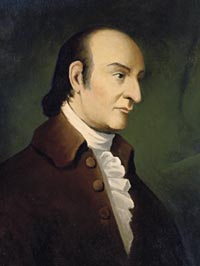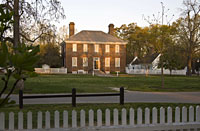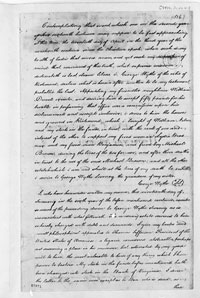Page content
George Wythe
- Born 1726 at Chesterville (now in Hampton, Virginia)
- Man of integrity and virtue, respected by all
- First Virginia signer of the Declaration of Independence
- Framer of the federal Constitution
- Instrumental in design of seal of Virginia
- Believed poisoned by his grandnephew in 1806
- Buried at the church where Patrick Henry made his "liberty or death" speech
Early years
George Wythe (pronounced "with") was born in 1726 at Chesterville in what is now Hampton, Virginia. His father was Thomas Wythe, a planter who died soon after George's birth. Wythe was reared by his mother, Margaret Walker Wythe, and probably received his early education from her. Margaret Wythe instilled in her son a love of learning that served him all his life. Even as an old man, Wythe took up new subjects, teaching himself Hebrew, for example. George Wythe read law with his uncle Stephen Dewey, who lived near Petersburg.
Admitted to the colony's General Court bar in 1746, Wythe first practiced in Elizabeth City County and later with the prominent lawyer Zachary Lewis. In 1747, Wythe married Zachary's daughter Ann. Wythe was admitted to the York County bar January 16, 1748; his wife Ann died August 8 the same year. The young widower was appointed clerk to the Committee of Privileges and Elections of the House of Burgesses in October.
Highly respected by fellow Virginians
George Wythe's signature is first among the Virginia signatures on the Declaration of Independence. He was so highly respected by his fellow Virginians that the other delegates left a space so that his signature would appear first, as he was absent from the meeting the day they signed the document.
"No man ever left behind him a character more venerated than George Wythe," Thomas Jefferson wrote. "His virtue was of the purest tint; his integrity inflexible, and his justice exact; of warm patriotism, and, devoted as he was to liberty, and the natural and equal rights of man, he might truly be called the Cato of his country."
Jefferson learned the law from Wythe, and, in a manner of speaking, Wythe's signature on the Declaration was a teacher's endorsement of his pupil's finest brief. Among Wythe's other law pupils were John Marshall, perhaps the greatest chief justice of the United States, and St. George Tucker. When Wythe was Virginia's chancellor, Henry Clay was his assistant.
Life of significant achievement
If Wythe had accomplished nothing more than signing the Declaration of Independence and teaching Thomas Jefferson, he would have earned a place in history -- but his life was crowded with achievement! He was Virginia's foremost classical scholar, dean of its lawyers, a Williamsburg alderman and mayor, a member of the House of Burgesses, and house clerk. He was the colony's attorney general, a delegate to the Continental Congress, speaker of the state assembly, the nation's first college law professor, Virginia's chancellor, and a framer of the federal Constitution.
Served in the House of Burgesses
Wythe was elected a burgess for Williamsburg in 1754, and soon he married Elizabeth Taliaferro (pronounced "Tolliver"). She was the daughter of planter and builder Richard Taliaferro, who built what is now called "the George Wythe House" about 1755, and also made substantial repairs and additions to the Governor's Palace about 1752. Taliaferro gave his daughter and her husband life rights to the house.
The House of Burgesses sent Attorney General Peyton Randolph to England as its agent in 1753. George Wythe succeeded Randolph as attorney general but resigned the office in Randolph's favor after Randolph returned in 1755. Wythe remained a Williamsburg burgess until 1758, when he was elected burgess for the College of William and Mary. He represented the college until 1761, when he was elected for Elizabeth City County.
Early supporter of revolution
An early opponent of the Stamp Act, Wythe was appointed to the Committee of Petition and Remonstrance in 1764 and drafted the remonstrance to the House of Commons that protested against the tax. Nevertheless, Wythe, like Peyton Randolph and others, opposed freshman burgess Patrick Henry's stormy resolves against the act the next year, regarding the resolves as redundant and ill timed.
Despite Virginia's deepening disputes with the Crown, Wythe maintained close friendships with governors Francis Fauquier and Norborne Berkeley, baron de Botetourt.
Association with Jefferson and the college
Thomas Jefferson met George Wythe during Governor Fauquier's administration. They were introduced by Professor William Small of the College of William and Mary. Wythe in turn introduced Jefferson to Fauquier, who invited the young man to play his violin in a Palace amateur quartet. Small, Wythe, Fauquier, and Jefferson often made a party of four at Palace dinners, where science, politics, and morals became regular topics of conversation.
Wythe was appointed to William and Mary's board in 1768 and was elected Williamsburg's mayor December 1 of that year. He became a vestryman of Bruton Parish Church in 1760. He was appointed clerk of the House of Burgesses July 16, 1767 and took the oath of office on March 31, 1768. When the burgesses ordered the Public Hospital built in 1770, Wythe was named one of its trustees. He remained house clerk until 1775, when he was elected a delegate to the Second Continental Congress.
Following instructions from the Virginia Convention in Williamsburg, Richard Henry Lee, another member of the Virginia delegation, rose at the Second Continental Congress and moved for American independence. Jefferson's declaration was approved July 4, but the document was not engrossed and ready for signing until August 2. By that time, Wythe had returned to Williamsburg, thus he and the other absent delegates signed later. Below Wythe's name appear the signatures, in order, of: Richard Henry Lee, Thomas Jefferson, Benjamin Harrison, Thomas Nelson Jr., Francis Lightfoot Lee, and Carter Braxton.
Designed seal of Virginia
Though 50 years old, Wythe proposed to fight in the Revolution, but his true service remained in government. He worked on the drafting of the first Virginia constitution, written mostly by George Mason. Wythe served with Jefferson, Mason, Thomas Ludwell Lee, and Edmund Pendleton on the committee that revised Virginia's laws. George Wythe was one of two members of the committee who designed the seal of Virginia. Virtue, sword in hand, stands with her foot on the prostrate form of Tyranny, whose crown lies nearby. The motto, "Sic Semper Tyrannis," may be translated "Thus Ever to Tyrants."
First professor of law in America
In 1777, Wythe was elected speaker of the Virginia House of Delegates. Two years later, he accepted appointment as professor of law and police in now-Governor Jefferson's reorganization of the College of William and Mary. It was the first such professorship in the nation. After the government moved to Richmond in 1780, Wythe taught classes, presided over moot courts, and conducted mock legislatures in the old Capitol.
Wythe accepted law students as boarders in his home and treated them as if they were the sons he never had. His kindness was returned by admiring pupils like Jefferson, who called him "my faithful and beloved Mentor in youth, and my most affectionate friend through life."
Late in the1780s, student William Munford preserved a glimpse of Wythe's domestic establishment. "Old as he is," Munford wrote, "his habit is, every morning, winter and summer, to rise before the sun, go to the well in the yard, draw several buckets of water, and fill the reservoir for his shower bath, and then, drawing the cord, let the water fall over him in a glorious shower. Many a time have I heard him catching his breath and almost shouting with the shock. When he entered the breakfast room his face would be in a glow, and all his nerves were fully braced."
In a dispute with the administration, Wythe resigned from the college in 1789 and accepted an appointment as judge of Virginia's Court of Chancery in Richmond. He moved there in 1791, turning his home over to Taliaferro's heir. The Reverend James Madison, president of the College of William and Mary, bought the house in 1792 following the death of the Taliaferro heir.
Chancellor Wythe seized the opportunity of one of his cases to try to cripple the institution of slavery. He ruled that Virginia's Declaration of Rights -- written by Mason and adopted in 1776 -- included African Americans among the "all men" born free and equally independent. "They should," Wythe said, "be considered free until proven otherwise." His ruling did not survive appeals.
Murdered by an heir
Elizabeth Taliaferro Wythe died in 1787. Long a foe of slavery, George Wythe freed several slaves, including Lydia Broadnax, who chose to remain in Wythe's service. He conveyed other slaves to Elizabeth's Taliaferro relatives. Near the end of his life, Wythe wrote his will in favor of a grandnephew, George Wythe Sweeney, but also gave generous bequests to his former slaves Michael Brown and Lydia Broadnax. A ne'er-do-well, Sweeney forged checks against Wythe's accounts to cover pressing debts. Hoping to avoid detection and inherit his great uncle's entire estate, he resorted to murder. Strawberries or coffee seem to have been the vehicle by which Sweeney poisoned both his great uncle and Michael Brown, who died within days. Wythe endured two weeks of agony, but as he lay dying, Sweeney's forgeries were discovered, and Wythe revised his will.
A grand jury indicted Sweeney for murder, but Sweeney went free because a jury concluded the only-circumstantial evidence against him was too weak to support a conviction. No witness was able to testify to seeing Sweeney poison either the household's food or drink. Cook Lydia Broadnax was thought to have been in the kitchen when, apparently, Wythe's breakfast coffee was poisoned, and may have seen Sweeney throw evidence in the fire, but neither she nor any African American was allowed to testify against a white person in court.
Wythe is buried at St. John's Church in Richmond, the church in which Patrick Henry made his "Liberty or Death" speech.
For further reading:



